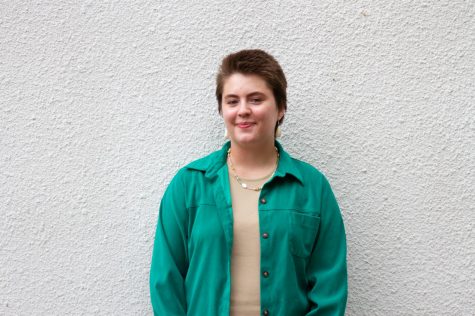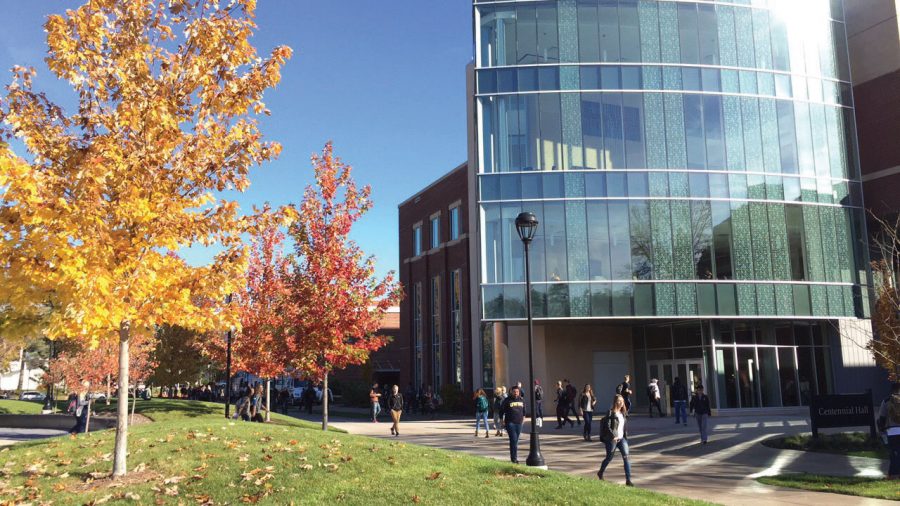UW-Eau Claire students still voice safety concerns
Remote learning announcement raises more questions on response to COVID-19
Photo by Colette St. John
Nikolaus Spittlemeister, a fourth-year student, stands in the Campus Mall to protest administration for their original decision to not move to remote learning after fall break.
Students across the UW-System have expressed varied reactions toward the announcements of remote and in-person learning on their campuses.
For students at UW-Eau Claire, the decision made on Nov. 12 to transition toward remote learning was not enough.
Franny Donovan, a fourth-year psychology student, said they are disappointed with the campus administration’s lack of attention to student voices in regard to COVID-19 health concerns.
There is still work to be done with available testing on campus and where it is currently located at the Davies Student Center on campus, they said.
“I am happy they’re testing more often but I am so upset there’s antigen testing in Davies and also PCR testing in Towers. I think that is super unsafe,” Donovan said.
In light of the lack of attention to remote learning on the UW-Eau Claire campus, petitions, protests and student activism have taken the lead in addressing the issue.
Nikolaus Spittlemeister, a fourth-year business student, said he is very upset with the administration’s lack of concern toward all students on campus. He said administrators come from a place of privilege when making decisions on COVID-19 safety for the campus.
“I am livid,” Spittlemeister said. “I am not going to deny, that I think everyone wants to have in-person classes. It is probably a known fact.”
Many other issues, Spittlemeister said, relate to the information the Chancellor related to students on how to approach leaving for the fall break.
“There is an issue where [Chancellor James C. Schmidt] says, I encourage you not to travel home and that is coming from a place of privilege,” Spittlemeister said. “There’s a lot of students who are financially reliant on their parents, and they need to go home for fall break, or even just to have meals.”
Spittlemeister has held several protests within the last several weeks, to give a voice to the student body on their campus safety concerns during the pandemic.
For students living in residential halls, antigen testing is available at the McPhee Physical Education Center on upper campus. Staff, faculty and off-campus students can receive antigen testing in the Dakota Ballroom at the Davies Student Center, according to the Chancellor’s Office.
Free COVID-19 testing is done by the Student Health Service, with recommendations from staff based on Blugold Protocol app results.
Jimmy Whitcomb, a third-year comprehensive theatre arts student, said although the decision toward remote learning is appreciated, he does not believe the university has handled the pandemic well — especially by offering in-person learning in the first place.
“I think they have done many good things,” Whitcomb said. “[The university has] made sure people wear masks, social distance in class and the new testing program is a really good thing. But the biggest mistake they made was bringing us back in the first place. 10,000 students from all over the Midwest brought back into a city — it was destined to go wrong.”
Wisconsin, as of Nov. 18, currently has a cumulative total of 342,155 positive COVID-19 cases statewide. Eau Claire county currently has a total of 6,149 positive cases as of Nov. 16.
Donovan said, as a residential assistant in Oakridge Hall, the fear of COVID-19 is much more imminent and they worry for their safety as they remain on-campus after the fall break.
“I believe a third of our staff has gotten COVID so far,” Donovan said. “Sometimes we have to deliver meals to residents who are bunkering or in quarantine. And, additionally [we need] a lot more mental health support for people who may be scared they are going to get COVID-19.”
On Oct. 15, Chancellor James C. Schmidt announced students who live on-campus and in Karlgaard Towers will soon be eligible for PCR testing for COVID-19 symptoms, they said.
“I understand they will be doing separate entrances and exits for that testing site,” Donovan said. “I think because of the airflow within Towers and the amount of foot traffic goes in and out of that building is super high already, it creates a really unsafe environment.”
Whitcomb said he feels the decision to transition toward remote instruction after the break was the best decision made, due to Wisconsin’s current classification as a “hot spot” for COVID-19 cases.
“It’s difficult for a lot of people, myself included,” Whitcomb said. “But, I trust in professors that they will be able to convert the last three weeks online and we’d still get a good learning experience from it. Ultimately, health and safety should be the number one priority.”
Spittlemeister said he has continued to challenge Chancellor James C. Schmidt’s decisions regarding COVID-19 safety and how the university continues to withhold information on the pandemic from its student body.
“He’s not asking faculty [or] staff what they want. He’s not asking students what they want,” Spittlemeister said. “He is solely focusing on what administration thinks is best. There’s a lack of transparency and there’s a lack of communication and he’s not addressing any of the concerns [students] had.”
Whitcomb said all community members of UW-Eau Claire should focus on the bigger picture of community health and safety, as future UW System and COVID-19 announcements are made.
“Be kind to each other,” Whitcomb said. “Don’t make this a competition of who has it worse than other people. Just know everyone’s struggling and everyone has things they have to get through.”
For a detailed overview of UW-Eau Claire’s case count, visit the university’s COVID-19 dashboard.
Nelson can be reached at [email protected].
*Edit was made on Nov. 18: The cumulative total cases of COVID-19 in Wisconsin is 342,155 as of Nov. 18, not 580 as of 8 a.m. on Nov. 17.

Evelyn Nelson is a third-year Journalism and Environment, Society and Culture student. This is her fifth semester on The Spectator. She enjoys fulfilling her dream of being a barista, at SHIFT Cyclery and Coffee Bar. Stop by for some great coffee and conversation!

